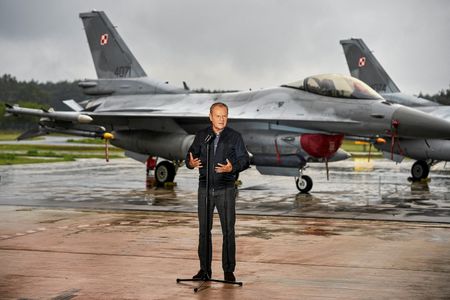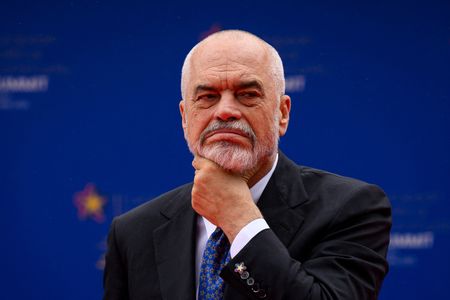By Conor Humphries
DUBLIN (Reuters) – Ryanair boss Michael O’Leary warned on Thursday that the Russian war in Ukraine would cause travel disruption for European airlines for years to come, a day after Poland shot down suspected Russian drones in its airspace.
Speaking at the company’s annual general meeting, O’Leary also said that Ryanair, Europe’s biggest airline, may exit Israel even after violence related to the war in Gaza recedes, blaming a row over airport fees.
Several Polish airports were temporarily closed on Wednesday as the country shot down Russian drones, before flights resumed hours later. There were knock-on effects on air-traffic control, causing flight delays across Europe.
“This is going to be an ongoing issue for all airlines and all European citizens for the next number of years,” group CEO O’Leary said.
“The risk is one of continuous disruption, rather than of safety.”
On Wednesday, just 60% of Ryanair’s flights were on time, compared to a normal rate of around 90%, he said.
O’Leary said safety was Ryanair’s priority, adding that he was confident European authorities would act swiftly to shut airspace and protect aircraft. The problem for airlines and passengers would be regular closures creating headaches as flights are delayed and schedules disrupted.
“There’s a huge increase in NATO air activity over southern and eastern Poland, that constrains the availability of airspace for commercial travel,” he said.
The impact of the incident, which marked the first time a member of NATO is known to have fired shots during the war, was discussed at a meeting of the company’s board of directors on Wednesday, O’Leary added.
Shares in Ryanair were up 2.4% by 1248 GMT, recovering ground from Wednesday when the Polish incident sent most European travel stocks lower.
POSSIBLE ISRAEL EXIT
In Israel, another country where Ryanair flights have been cancelled due to safety concerns, O’Leary said his airline may walk away from the country for good as it was being “messed around” by airport authorities there.
Earlier this northern hemisphere summer, the airline said it would not return to Israel until October 25 at the earliest, in line with many international carriers who have halted flights due to conflict in the region.
“I think there’s a real possibility that we won’t bother going back to Israel,” he said.
“Unless the Israelis kind of get their act together and stop messing us around, frankly, we have far more growth elsewhere in Europe,” he added.
Ryanair objects to the fact that Tel Aviv’s Ben Gurion Airport charges it the higher rate for use of the main terminal when the cheaper low-cost terminal is closed for security reasons, O’Leary said.
He said Ryanair would start flying back to Jordan this month or next.
(Reporting by Conor Humphries; Additional reporting by Sarah Young and Muvija M; Editing by Emelia Sithole-Matarise)











